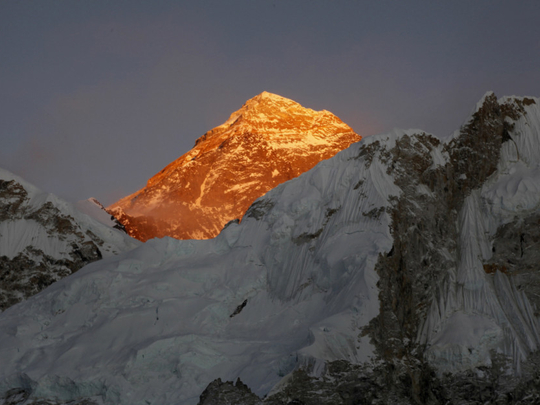
It’s a scene from one of John Martin’s apocalyptic paintings. Or a modern disaster movie. But this isn’t computer-generated imagery. Everest has begun to collapse, as if under the collective weight of its explorers.
Or so it seems. Reports that the rocky outcrop Hillary Step, named after Sir Edmund Hillary, who first climbed the mountain with Tenzing Norgay in 1953, may have been destroyed during the Nepal earthquake of 2015 (although some Nepalese say it’s just been buried under snow), speak to our desire to extend our human dominion. Even the name signifies appropriation — our taxonomy of nature. Metaphorically, it seems, the Earth reacts.
But some climbers now fear that the disappearance of the near-vertical step — a final challenge to those attempting the ascent — will make it easier to climb Everest — and thus open it up to new depredations. Some even wonder if it is time to impose severe limits — or even a ban — on expeditions that are becoming too popular, and too invasive , affecting the very qualities that define the place.
The politics of the issue are complicated. There are local economies predicated on the visits of crazy westerners determined to ascend those heights, as if humankind were affronted by the notion of eminence. There have been heroes and there have been sacrifices. But to this end? Where the mountain becomes one big litter heap, and we don’t even take our dead away with us, let alone our rubbish, Everest literally becomes a graveyard for our ambitions.
There may now be a good case for declaring Everest and other over-popular peaks as reservations — perhaps even in the way that visitors to Uluru (once known as Ayers Rock) in Australia’s Northern Territory have been asked not to climb a site sacred to the Anangu people.
Although inevitably, it seems some people cannot resist, and recent accounts of climbers stranded on Uluru have only underlined the sensitivity of these issues and conflicting meaning — of ownership versus wonder.
It is the great paradox: The fragile human set against apparently immovable majesty. And we cannot reconcile it. As Kenneth Clark opined, from his lofty High Tory account of western civilisation, before the late 18th century, no one dreamed of climbing a mountain for its own sake.
But with the Enlightenment came a new curiosity, a new religion, the worship of nature. And what we observed, we also destroyed. Turner and Ruskin looked at the Alps and the Lake District with a sense of the sublime: Pagan, in the former, Christian, in the latter. In the 21st century, new nature writers have sought to retrack and rewild. In his book, Landscape, Robert Macfarlane lists more than 200 archaic and long-lost nouns and adjectives associated with mountains. But, just as Prometheus was chained to a mountain for having stolen the fire of the deities, it is too late. Industrialism has played its part — both directly and otherwise. Until the 20th century, Berry Head, a rocky promontory at the south end of Torbay, stood proudly, even sublimely, out to sea. Then it began to be quarried for its limestone and used in steel processing. A beauty spot hymned by the Romantics and the Victorians was blown apart and half of it reduced to rubble, which was loaded on to ships and carted off to Dagenham to make Ford cars.
Clearly, better qualities are also at work. It is human curiosity to see stairs, a tree, a hill and the atavistic instinct is to climb up, to get a better view. As if we will be vouchsafed some new vision, some new path, some new direction. But what we really see is ourselves. I got royally lost trying to clamber up the wooden foothills of the Pyrenees in Catalonia last year, and very nearly took a tumble. I realised my foolhardiness, and crawled back down, clinging from one branch to another. I had to admit defeat. The ravens of El Corb soared above me, cawing out their rightful claim.
We need to reinstate our awe and dump the bucket list. We do not own these places, no matter how many names we give them. The fact that someone (usually a man) has stuck a flag at the top of a peak has no greater meaning than that fact. What does it mean that only three people have descended to the ocean’s profoundest depths (one of them being the director James Cameron, a detail which I personally find somehow depressing)? Or that the Russians have planted their flag on the Arctic sea bed, or the Americans their stars and stripes on the moon?
We pit our puny humanness at the scale of things, as if at the desperate knowledge that ultimately, we won’t mean anything. When humans are over, and have become just another geological stratum, the entirety of our existence will be represented by a layer no thicker than a cigarette paper. Now I find that rather beautifully humbling.
— Guardian News & Media Ltd
Philip Hoare is the author of Leviathan or, The Whale and The Sea Inside.








